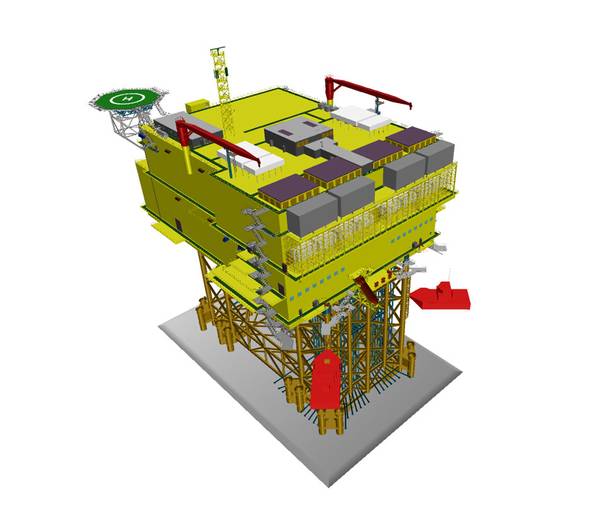
A consortium between Dragados Offshore and Siemens Energy has won a contract with Amprion Offshore to build the HVDC converter platforms for both the LanWin1 and LanWin3 HVDC grid connection projects.
The projects are the first of two-gigawatt bi-pole converter systems awarded as part of the transmission of electrical energy generated in offshore wind farms in the German North Sea, part of Germany’s Energy Transition, where Amprion is the transmission system operator responsible for both systems.
The contract for the consortium is worth a total of more than €4 billion (currently around $4,3 billion), including maintenance for ten years.
The two projects are also among the first of the overall 2 GW offshore programs to be developed in Northern Europe. Siemens Energy said the contract represented the largest offshore grid connection order in its history.
"With the Wind Energy at Sea Act, the German government set the framework for further expansion of offshore wind energy in Germany: Installed capacity is to increase to at least 30 GW by 2030 and as much as 70 GW by 2045. However, this requires more than just new wind farms. More powerful high-voltage direct-current (HVDC) transmission systems must be built to transport electricity over long distances.
The increase in transmission capacity to two gigawatts represents a decisive technological leap, as more wind farms can now be connected to the grid via the new systems. Siemens Energy's recently implemented projects had a transmission capacity of 900 megawatts (MW). Siemens Energy used a "bipolar configuration" design to create the two-GW systems, meaning they can effectively operate at twice the voltage and transmit twice the power. The new projects are among the world's first offshore grid connections of this type," Siemens Energy said.
The wind farms will be connected to both offshore stations via 66 kV AC direct connection systems and convert the power to 525 kV DC voltage for transmission to shore.
The two HVDC onshore stations for LanWin1 and LanWin3 will be located at the Wehrendorf and Westerkappeln grid connection points, respectively, where they will be connected to the 380 kV links yet to be built for the AC transmission grid.
With a total transmission capacity of 4 GW, these converter stations will be able to supply enough electricity for a major city like Berlin.
Who is building what?
Dragados Offshore is responsible for providing the offshore platforms, including detailed design and engineering, procurement, fabrication, construction, load out, transportation, installation and hook-up of the offshore platform, and installation and commissioning of its platform systems.
The topsides will weigh about 24,000 tons each, and the jackets around 10,000 tons each. Siemens Energy will manufacture all major high-voltage equipment for the two connection systems, such as converter technology, transformers, and switchgear in Germany and will assume the systems’ complete maintenance for a period of 10 years.
LanWin1 and LanWin3 are scheduled to be in commercial operation at the end of 2029 and 2030, respectively.
"The award of both LanWin1 and LanWin3 is considered a major milestone for Dragados Offshore, as these are the first 2 GW HVDC converter station platforms to be developed in the world, and therefore expands our activities for the offshore wind industry, providing low carbon emission projects for the energy market," Dragados Offshore said.
"At the moment of this award, our HVDC project portfolio includes in addition the DolWin6 platform, which is in the offshore completion phase, the BorWin5 platform which is under construction in the yard in Puerto Real (both awarded previously by TenneT) and the DolWin4 and BorWin4 platforms, which are in the design phase, both previously awarded by Amprion Offshore," Dragados added.
Tim Holt, a member of the Managing Board of Siemens Energy, said: "The wind energy industry has repeatedly achieved outstanding technological advances in recent years, be it in the performance of wind turbines or grid connections. The two-gigawatt system fits in seamlessly here, making the transmission of green power more efficient and creating standardization where individual designs were previously necessary. Developments in the industry have taken time, which must no longer be wasted against the backdrop of ambitious offshore expansion targets and the drastic consequences of climate change.